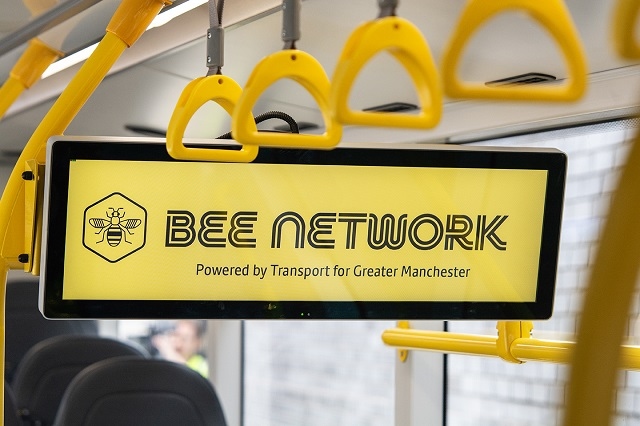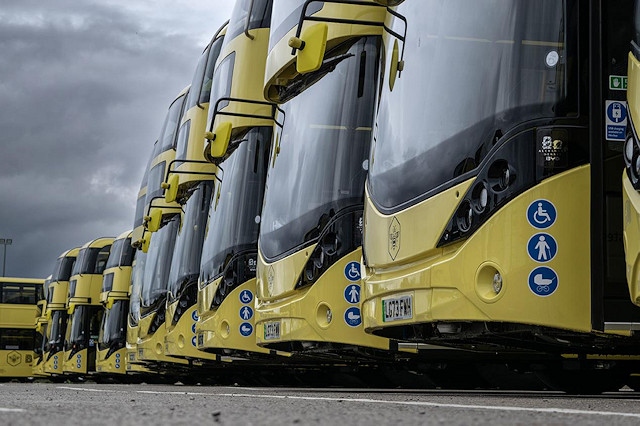Bee Network moves ahead as Greater Manchester gets ready for phase two of bus franchising
Date published: 20 February 2024

Bee Network
Greater Manchester will see its ambitious plans for the full delivery of the Bee Network – transforming public transport across the region – take a big step forward in just over one month’s time, with the launch of phase two of bus franchising.
On Sunday 24 March buses in Rochdale, Oldham and parts of Bury, Salford and north Manchester will come back under public control for the first time in almost 40 years.
Andy Burnham made a series of major announcements at a press conference in Bury on Monday morning (19 February), where he confirmed that the second phase of the Bee Network’s roll-out will go ahead as planned.
The change will mean a total of 324 bus routes – 188 routes in phase one and 136 routes in phase two – totalling 50% of the bus network in Greater Manchester, will be managed by Transport for Greater Manchester (TfGM) as part of the Bee Network. General bus services in phase two will be operated by Stagecoach, First Group and Diamond under a franchising arrangement.
Here are the five key announcements made by Andy Burnham on Monday 19 February.
Bus roll-out will go ahead as planned – and should be smoother
As expected, the Mayor confirmed the next round of bus franchising – the process whereby services come under local control, with politicians accountable for how they perform. Sunday 24 March, is the date when Bee Network buses roll into Rochdale and Oldham plus the remaining parts of Bury not covered in the first round last September, as well as more of Salford and north Manchester.
When the first ‘tranche’ came under public control, there were complaints from passengers in Wigan and Bolton, with Mr Burnham admitting there had been ‘teething problems’ in moving to the new system. “We didn’t expect everything to be perfect, but everyone involved has rolled up their sleeves and has been working hard to make things better,” he added in November, weeks after they rolled out.
The transition in the next phase should be smoother and Vernon Everitt, Greater Manchester’s transport commissioner, said: “We have learned lessons from that first tranche.
“There’s great collegiate working across the bus operators and across TfGM to pull forward ahead of that transition weekend a lot of the work that happened in the first tranche over the weekend itself. Crucially, there will be less reliance on agency drivers in this tranche.
“A number of the teething problems we had in tranche one was purely around an unfamiliarity of routes. That’s less of the case in this tranche.”
Later on, the mayor said there ‘won’t be any’ agency staff on tranche two routes. He claimed: “I am confidently going to say that it will be better for the public on day one.”
That being said, it’s not expected to be completely plain-sailing, added Mr Everitt: “The process here is still quite complex in the early days, because it could be that not everything goes perfectly.”

The fare cap will stay
Another immediate announcement came in the form of confirmation an existing policy will stay in place. The £2 fare cap for single journeys will stay ‘in place for at least this calendar year’, according to Mr Burnham.
“It is my mission to keep fares low and the standard of service high,” he told reporters. “That’s why the £2 fare cap will be in place for at least this calendar year, but hopefully beyond as well.”
The cap first came to Greater Manchester in September 2022, and was rolled-out by the government nationally that December. It is worth noting the government has already confirmed funding for the fare cap will stay in place until the end of 2024.
Tracking comes to the app
Mr Burnham says he has also responded to a ‘big call’ to change the Bee Network. By the time tranche two rolls out, users will be able to track buses live – and also plan their journeys. Mr Burnham said that the tracking feature will work on all buses in Greater Manchester, not just Bee Network buses.
That was done to ‘make the app significantly better’ in order to encourage more people to use public transport. But there was a caveat mentioned by the mayor, meaning there again could be teething problems.
“Part of it is linked to bus operations, and the drivers making sure their bus is trackable, so we are obviously working on that,” he added.
A night bus ‘pilot’ will come in the summer
Earlier this month, it was revealed that night bus services will come to Wigan and Bolton at some point in 2024 – but the routes, timing, and frequency of the services remained a mystery.
That was clarified on Monday by the mayor, who confirmed that the V1 service from Manchester Royal Infirmary to Leigh and the 36 route from Piccadilly Gardens to Bolton would be in the ‘pilot’. That will launch in the summer, with a final date to be worked out following discussions with the firms that operate those services on behalf of the Bee Network, plus the trade unions affected.
While the timing is still uncertain, it is certain that the pilot will see hourly buses to help late-night revellers, and hospitality and night staff get home.
“It is my firm intention to have a network of night services as the Bee Network develops,” he added.
The fourth transport mode to join the Bee Network
Away from buses, there will be another pilot scheme taking place – this time on commuter railway lines. For years, the mayor has talked about bringing in local rail routes into the Bee Network, naming it as a commitment to bring six lines in by 2030.
Instead, buses stole the headlines over the last 12 months as they were brought under public control for the first time in decades. So a mention of the fourth mode of transport to join the Bee Network was surprising.
GM Rail – as it will be called – will one day allow commuters to tap-in or tap-out on six railway routes in and around the city-region, just like trams. It was announced a few months ago that the requisite technology had been brought to the Stalybridge-Manchester Victoria route and Glossop-Manchester Piccadilly, but until now little more had been said of the project.
It now appears, however, the pilot will help pave the way for the ticketing aspect of GM Rail to be in place before 2030. Vernon Everitt said: “I fervently hope that we will rapidly see through the pilot that we will be able to integrate the ticketing earlier than that.
“We have to work with the Department for Transport and Great British Railways, and several other partners, to get all our ducks in a row to make that happen. I think the pilot will demonstrate we are able to attract more people to rail by simplifying the fares and making it easier to pay for things.”
Ethan Davies, Local Democracy Reporter
Do you have a story for us?
Let us know by emailing news@rochdaleonline.co.uk
All contact will be treated in confidence.
Most Viewed News Stories
- 1Failing care home shut by health watchdog following safety concerns
- 2Newhey's Char Steakhouse and Bank Chamber close with immediate effect
- 3Man charged in connection with assault on Christmas Eve in Sudden
- 4Woman of Rochdale 2024 – Lorenza Pye
- 5Two men arrested after police chase ends up in Middleton river
To contact the Rochdale Online news desk, email news@rochdaleonline.co.uk or visit our news submission page.
To get the latest news on your desktop or mobile, follow Rochdale Online on Twitter and Facebook.


